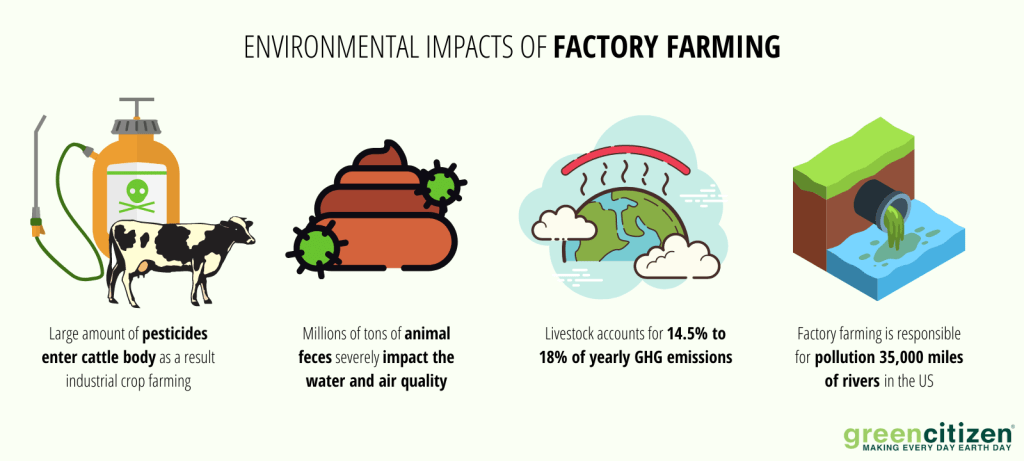Factory farming dominates the global food industry, producing immense volumes of meat, dairy, and eggs to satisfy rising consumer demand. Yet this intensive system carries significant hidden costs that impact the environment, society, and economy. From contributing to climate change and polluting soil and water to raising ethical concerns about animal welfare and worker exploitation, its consequences are deeply troubling. This article explores how factory farming affects ecosystems, public health, and local communities while highlighting the pressing need for sustainable agricultural practices that balance productivity with ethical responsibility
In the past few decades, factory farming has become a prominent method of animal production, providing large quantities of meat, dairy, and eggs to satisfy the ever-increasing demand. However, this intensive agricultural system has left a lasting impact that extends beyond the food industry. From environmental degradation to social and economic consequences, the effects of factory farming are widespread and long-lasting. The negative consequences of this practice have sparked debates and raised concerns about its sustainability and ethical implications. This blog post aims to provide an in-depth analysis of the lasting impacts of factory farming, exploring the environmental, social, and economic consequences that it has brought about. We will examine the adverse effects of factory farming on the environment, such as land degradation, air and water pollution, and greenhouse gas emissions. We will also delve into the social implications, such as animal welfare, public health, and the exploitation of workers.

1. Harmful environmental effects of factory farming.
Factory farming is an industrialized system of animal agriculture that has significant environmental impacts. It has been estimated that animal agriculture is responsible for 18% of global greenhouse gas emissions, with factory farming being a major contributor. The environmental impacts of factory farming extend beyond greenhouse gas emissions. The use of pesticides, fertilizers, and antibiotics contribute to soil and water pollution. Additionally, factory farming requires significant amounts of land, water, and energy, further exacerbating resource depletion and climate change. The harmful environmental effects of factory farming have long-lasting consequences on the health and sustainability of our planet, and it is crucial that we take steps to address these impacts.
2. Contributing to climate change.
One of the most significant impacts of factory farming is its contribution to climate change. The methods used in factory farming, such as the use of fossil fuel-powered machinery, transportation of animals and feed, and the production of large amounts of waste, emit significant amounts of greenhouse gases into the atmosphere. These practices have led to the release of large amounts of carbon dioxide, methane, and other greenhouse gases into the atmosphere, which have been directly linked to global warming and climate change. The United Nations Food and Agriculture Organization has estimated that the livestock sector alone contributes around 14.5% of all human-induced greenhouse gas emissions. Thus, factory farming has a considerable impact on the environment, which will have long-term consequences unless action is taken to address it.
3. Soil and water pollution issues.
Soil and water pollution issues are among the most significant and long-lasting environmental consequences of factory farming. The intensive use of chemicals, fertilizers, and pesticides in agriculture has led to widespread soil degradation and contamination, reducing soil fertility and biodiversity. The runoff from industrial farms also poses a major threat to water quality, with harmful pollutants such as nitrogen, phosphorus, and fecal matter leaching into streams, rivers, and groundwater. This pollution not only affects aquatic ecosystems and wildlife but also threatens human health by contaminating drinking water sources. The long-term impacts of soil and water pollution are particularly concerning, as they can persist for decades, even after agricultural activities cease. Addressing these pollution issues will require significant changes in agricultural practices and regulations, as well as public awareness and engagement in sustainable farming practices.
4. Long-term damage to farmland.
One of the most concerning and long-lasting impacts of factory farming is the long-term damage it can cause to farmland. Due to the overuse of chemical fertilizers and pesticides, soil quality can deteriorate over time. This can lead to reduced crop yields, decreased biodiversity, and soil erosion. Additionally, factory farming practices often involve monoculture, where the same crop is planted continuously in the same soil, leading to depletion of nutrients and increased vulnerability to pests and diseases. In extreme cases, the damage can be so severe that the land becomes unusable for farming, which can have serious economic consequences for local communities that depend on agriculture. It is essential that steps are taken to address these issues and promote sustainable farming practices to mitigate the long-term damage caused by factory farming.
5. Negative impact on biodiversity.
Factory farming has been linked to a number of negative environmental impacts, including a significant loss of biodiversity. This is due to the large-scale clearing of land for animal feed production and the removal of natural habitats for wildlife. The use of pesticides, fertilizers, and other chemicals in feed production also contributes to the decline in biodiversity. As a result, many species are at risk of extinction, and the ecological balance of local ecosystems is disrupted. In addition to the threat to wildlife, the loss of biodiversity can have far-reaching effects on human health and well-being, as we depend on natural ecosystems for a variety of resources, including food, medicine, and clean water. Addressing the negative impact of factory farming on biodiversity is crucial for the long-term sustainability and health of our planet.

6. Ethical concerns for animal welfare.
One of the most significant ethical concerns arising from factory farming is the impact on animal welfare. The industrialized nature of factory farming involves raising large numbers of animals in confined spaces with little regard for their well-being. Animals are often subjected to inhumane living conditions, such as cramped cages or pens, and are routinely subjected to painful procedures such as dehorning, tail docking, and castration without anesthesia. These practices have led to increased scrutiny and criticism from animal rights organizations, as well as concerns over the treatment of animals in the food industry. As consumers become more informed and conscious of where their food comes from, the ethical considerations of animal welfare are increasingly important to address for the sustainability of the food industry.
7. Social implications for workers.
Factory farming is a highly controversial practice that has wide-ranging impacts on the environment, economy, and society. One of the most significant social implications of factory farming is its impact on workers. The intensive nature of these operations requires a large workforce, often made up of low-wage and migrant workers who are subjected to poor working conditions, low pay, and limited job security. Many workers are exposed to dangerous chemicals and face high rates of injury, illness, and death. Furthermore, factory farming can lead to the displacement of small-scale farmers and rural communities, as large corporations move in and take over local markets. These social impacts must be taken into consideration when evaluating the true cost of factory farming and determining the best path forward for sustainable agriculture.
8. Health risks for consumers.
The health risks for consumers associated with factory farming are numerous and concerning. The overcrowding and unsanitary conditions in which factory-farmed animals are kept can lead to the spread of disease and the use of antibiotics in livestock can contribute to the development of antibiotic-resistant bacteria. In addition, the consumption of meat and other animal products from factory farms has been linked to an increased risk of heart disease, certain cancers, and other chronic illnesses. Furthermore, the use of hormones and growth-promoting drugs in factory farming practices has also raised concerns about the potential impact on human health. These health risks for consumers are a serious consequence of factory farming and highlight the need for more sustainable and humane agricultural practices.
9. Economic impact on local communities.
The economic impact of factory farming on local communities cannot be ignored. While these facilities may create jobs and generate revenue in the short term, the long-term effects can be detrimental. One major concern is the consolidation of the industry, which often leads to the displacement of small family farms and the loss of their economic contributions to the community. Additionally, the pollution and health risks associated with factory farming can drive down property values and discourage potential new businesses from investing in the area. The negative impact on local tourism and recreation industries should also be considered, as no one wants to visit a polluted and odor-filled area. In order to fully understand the economic impact of factory farming, it is important to consider both short-term gains as well as long-term consequences on local communities.
10. The need for sustainable alternatives.
The need for sustainable alternatives is a critical consideration when analyzing the lasting impacts of factory farming. As the global population continues to grow, the demand for meat and dairy products is rising exponentially. The current industrial agriculture system relies heavily on factory farming, which is a major contributor to environmental degradation, including deforestation, water pollution, and greenhouse gas emissions. Sustainable alternatives, such as regenerative agriculture, can help reduce the impact of factory farming on the environment while providing a healthier and more ethical food system. Regenerative agriculture, which involves the use of more natural farming practices, can help to rebuild soil health, improve water quality, and promote biodiversity, all while reducing the carbon footprint of food production. By promoting sustainable alternatives to factory farming, we can work towards a more environmentally and socially responsible food system that benefits both people and the planet.
In conclusion, the impacts of factory farming are far-reaching and complex, affecting our environment, society, and economy on both local and global levels. The environmental consequences are particularly concerning, with pollution, deforestation, and climate change being just a few of the devastating effects. Socially, factory farming can lead to issues related to animal welfare, worker exploitation, and public health. Moreover, the economic consequences can be significant, including negative impacts on small farmers and local communities. It is important for individuals, organizations, and governments to take action to address the lasting impacts of factory farming and promote sustainable and ethical agriculture practices.



